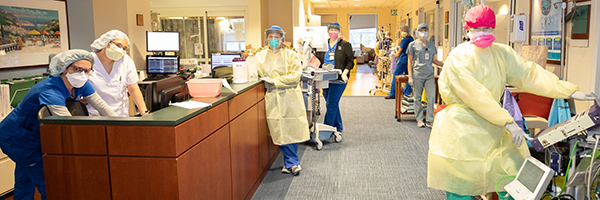EP14
Ethics, Privacy, Security and Confidentiality EP14
- Provide one example, with supporting evidence, of a security issue resolved with a clinical nurse’s or clinical nurses’ contributions to an interprofessional group.
Security Concern
Greenwich Hospital (GH) is not immune to the increased violence and aggression from patients and visitors seen throughout the country. The Emergency Department (ED) has seen an increase in patients and visitors intoxicated from alcohol, an increase in substance abuse, an increase in patients with altered mental status and overdose, and an increase in gang activity and gunshot wounds. These have increased actual and potential aggression, leading to security issues with nurses concerned for their safety.
In July 2019, during a daily Emergency Department Interprofessional Safety Huddle, Veronica Stanton, BSN, RN, Emergency Department Charge Nurse/Clinical Nurse, noted the concern of nurses not feeling safe when a patient is escalating, i.e., being combative or verbally abusive. The safety huddles are attended by nurses, physicians, secretaries, ED techs, transport staff, admitting officers, security guards and nursing leadership. Other nurses during the huddle indicated that they were being reactive rather than proactive in these situations and were not sure what the available security could do or whether they could help de-escalate patients when these behaviors were exhibited. (Evidence EP14-1, Huddle Safety Concern, July 2019)
Nurses’ Contribution to Interprofessional Team
In August 2019, the Emergency Department management team of Chris Davison, MD, Director ED; Shelby Smith, BSN, RN, ED Nurse Manager; Veronica Stanton, BSN, RN, Charge Nurse/Clinical Nurse; and Amanda Jagodzinski, BSN, RN, Clinical Coordinator/Clinical Nurse, brought the safety concerns to Mark Larobina, Director of Security. This interprofessional group discussed the ED nurses’ concerns about increased episodes of aggressive and violent behavior and that they did not feel safe at work. The group reviewed the status of security in the hospital, their role in the ED and the level of training. (Evidence EP14-2, ED Security Meeting, August 1, 2019)
Larobina and the team determined opportunities to enhance the presence and skill level of security through a more purposefully trained Crisis De-escalation Team (CDT). The CDT consists of personnel who are trained, hired and present in the Emergency Department 24/7 with the purpose of helping to identify early escalation behaviors, providing early intervention to de-escalate, and intervening immediately and appropriately if a patient or visitor becomes combative or violent.
Marc Kosak, SVP, Director of Operations, approved the budget for the highly trained team of security staff, the Clinical De-escalation Team (CDT), for the ED.
The addition of the CDT in the ED was shared at the September 17, 2019 GH Safety Huddle, and the four CDT members were introduced to the attendees. The GH Safety Huddle is held daily at 9 a.m., attended by representatives from all departments. Information shared at the huddle is expected to be shared with all employees. (Evidence EP14-3, Daily Huddle Report, September 17, 2019)
Resolution of Security Concern
At the December 2019 Emergency Department staff meeting, Smith and Larobina reviewed with the staff the original safety concern and the introduction of the CDT support, and discusses whether there were concerns about how the CDT personnel had intervened during times of crisis. The ED staff’s feedback indicated that they feel safer with the CDT personnel and their skills, and that the presence of the CDT has made an impact to decrease incidents. (Evidence EP14-4, December 2019 ED Staff Meeting Minutes)
The CDT is a welcomed solution that has made nurses feel safer in their work environment. The security issue was resolved, as the CDT has made nurses feel safer and has reduced escalation events.

